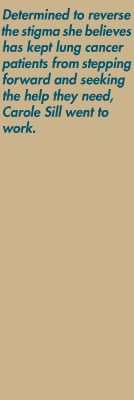When Carol Sill learned she had lung cancer in November 2004, she and her husband, Dennis, searched the Web for a support group near their Sacramento home. They called the American Cancer Society. They checked with the American Lung Association. Nothing.
"If I had breast cancer, I'd be able to choose from literally dozens of support groups and help lines right in our area. But there was nothing for lung cancer," Sill said.
Now there is. Determined to reverse the stigma she believes has kept lung cancer patients from stepping forward and seeking the help they need, Sill went to work. She founded a support group that meets at UC Davis Cancer Center under the leadership of Cancer Center social worker Carolyn Guadagnolo. Sill also forged ties with the Gail P. Ramos Lung Cancer Foundation in Fairfield, to help that group expand its fundraising efforts for lung cancer research in Sacramento. During National Lung Cancer Awareness Month in November, she told her story to the Sacramento Bee and the regional ABC and NBC affiliates.
"Invisible like us"
Lung cancer is the No. 1 cancer killer in the United States, but it lags far behind breast and prostate cancer in terms of public attention. At one recent meeting of the support group Sill established, a woman talked about ribbons. Breast cancer has a pink ribbon; prostate cancer's is blue. The lung cancer ribbon is clear, she had discovered. "Invisible. Like us," she told the group.
That's changing. ABC anchorman Peter Jennings' death from lung cancer last August put the disease in the headlines. That same month Dana Reeve, widow of actor Christopher Reeve, confirmed her lung cancer diagnosis, helping to raise awareness that lung cancer is increasingly a disease of younger women who have never smoked. She died of the disease March 6.
"Twenty years ago, the typical lung cancer patient was an older man who had a smoking history," said David Gandara, director of the Thoracic Oncology Program at UC Davis Cancer Center. "But lung cancer rates for men are down, while they are climbing in women. And in my clinic, more than one-third of our lung cancer patients are never-smokers — individuals who have smoked fewer than 100 cigarettes in their lifetime."
Improving treatment
Treatments are also changing. Last year, a Southwest Oncology Group study led by Gandara demonstrated the best long-term survival rates yet reported in patients with locally advanced, non-small cell lung cancer. Another study, co-authored by Gandara, showed that administering chemotherapy after surgery can boost five-year survival for patients with early stage, completely resected non-small cell lung cancer tumors to more than 60 percent. Both studies made national headlines.
Newer drugs are targeting tumors in more specific ways. Half a dozen of these molecularly targeted agents are being evaluated at UC Davis Cancer Center right now. UC Davis researchers are also looking for clues that will let doctors better determine which patients will respond to which targeted agents, and are studying new methods of preventing lung cancer recurrence.
Tahoe to Turlock
In its first three months, Sacramento's first lung cancer support group has grown to 60 members. Meetings are held on Wednesdays to coincide with the Cancer Center's multidisciplinary lung clinic and Thoracic Tumor Board. Patients from as far away as Palo Alto, Tahoe and Turlock attend, often because no lung cancer support group is available closer to home.
Read first-person stories written by Sill and four other lung cancer patients:
For information about cancer support groups available in the greater Sacramento region, please visit the Cancer Resource Center on the first floor of the UC Davis Cancer Center or call (916) 734-5935. Information is also available online in the "Patients & Visitors" area of our Web site at www.ucdmc.ucdavis.edu/cancer.


